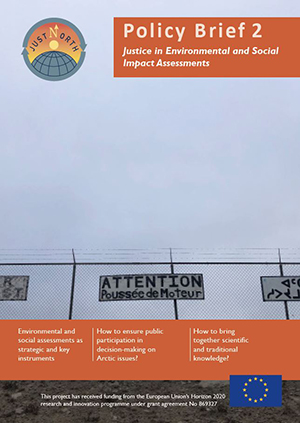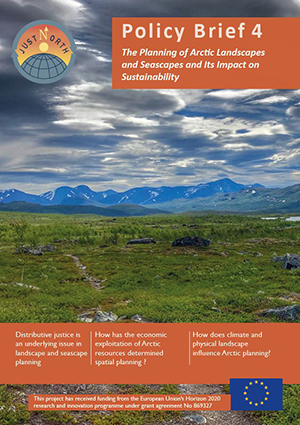POLICY BRIEFS
JUSTNORTH policy briefs are topical outputs drawing from research of the JUSTNORTH project, an undertaking funded by the European Union under the Horizon 2020 programme.
In these briefs, we build on the research findings of 17 case studies featuring different existing economic activites in the Arctic (Work Packages 2-4) and underpinned by the various concepts, schools, and forms of justice (Work Package 1).
EU Integrated Arctic Policy Analysis Report and Recommendations
This report draws on findings from our continuous dialogue with Arctic stakeholders and rightsholders over several years, we propose a set of recommendations to address these challenges and suggest pathways for opportunity. If implemented, we believe that they would lead to significant improvements of justice considerations across all of its dimensions.
Key Challenges Found in this report
Key Challenge 1: EU Arctic Policy and Local Political Ownership in Decision-Making
Key Challenge 2: EU Climate Change Mitigation Policies
Key Challenge 3: Sustainability and Impact Assessments
Key Challenge 4: Social Integration of Extractive Activities
Key Challenge 5: Land Transport and Connectivity
Key Challenge 6: Governance of Overlapping Maritime Activities
Key Challenge 7: Demographic Changes and Outmigration
Key Challenge 8: Indigenous Peoples and Arctic Governance
Key Challenge 9: Arctic Scientific Research and Traditional Knowledge
Key Challenge 10: EU Arctic Governance
Decision-Making for Sustainable Economic Development in the Arctic
How political decisions are made and by whom are key factors shaping perceptions about whether decision-making is just and democratically legitimate? This issue is doubly significant in the context of Arctic sustainability.
Justice in Environmental and Social Impact Assessments
Environmental Impact Assessments (EIAs) are a mainstay of sustainability practice. A legal requirement in many countries, they can function as an important tool for giving voice to stakeholders affected by development projects and new economic activities and to empowering vulnerable groups. And yet, environmental impact assessments are not without problems, as research by JUSTNORTH shows.
Owning and Managing Living and Renewable Natural Resources and Biodiversity
From fisheries to minerals extraction, from hunting to husbandry-natural resources are the mainstay of both modern economic activities in the Arctic region and traditional livelihoods. For local and indigenous communities, nature and the resources it provides are also a source of cultural value, rooted in a a living sense of connectedness with the natural world.
The Planning of Arctic Landscapes and Seascapes and Its Impact on Sustainability
Across the Arctic, there is a surge of new economic activities, ranging from energy development to new transportation systems, from resource exploitation to tourism. Significantly impacting landscapes, livelihoods, and ways of lifes, new economic activities in many cases give rise to competing uses of spaces.
Climate Change Factors in Multi-Regulatory Responses in the North
This brief discusses the shortcomings and concerns around lack of adequate regulatory responses for climate justice. It is also clear that measures and support for adaptive responses are weak or even non-existent.
Arctic Governance Institutions as Enablers and Barriers for Justice
Our research shows that the capacity of Arctic governance institutions to represent the interests and values of the region’s people and actors is, on the whole, relatively good. Still, there are challenges. The fact that many institutions operate in a compartmentalized fashion is one. This can serve as a block to reckoning with the full complexity of justice claims. The perception held by many people in remote and sparsely populated areas that their interests tend to be insufficiently incorporated into national policy is another challenge.
Economic Briefs
If you found our Policy Briefs helpful and want to know more, you can read our Economic Briefs. These briefs present the current situation in the Arctic and assesses regulatory framworks for future sustainability.








